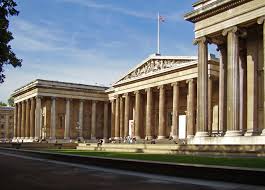记忆方法
将“museum”与“mu-se-um”分解,想象一个“mum”(妈妈)在博物馆(mus-e-um)中参观。这种形象记忆可以帮助你记住单词的拼写和意思。
以上内容由AI生成, 仅供参考和借鉴
中文词源
museum 博物馆
来自Muse,缪斯女神,-um,表地点。字面意思即缪斯女神的圣殿,与缪斯女神对话的地方。在古希腊时期用以指学校,图书馆,艺术学校,现仅用于指图书馆。
英语词源
- museum
-
museum: [17] Etymologically, a museum is a place devoted to the ‘muses’. It comes via Latin mūsēum ‘library, study’ from Greek mouseion ‘place of the muses’, a noun based on the adjective mouseios ‘of the muses’. This in turn was derived from mousa ‘muse’, source of English muse [14]. Other English words from the same source are mosaic and music. But muse ‘ponder’ is not related; it comes, like its first cousin amuse, from Old French muse ‘animal’s mouth’.
=> mosaic, muse, music - museum (n.)
- 1610s, "the university building in Alexandria," from Latin museum "library, study," from Greek mouseion "place of study, library or museum, school of art or poetry," originally "a seat or shrine of the Muses," from Mousa "Muse" (see muse (n.)). Earliest use in reference to English institutions was of libraries (such as the British Museum); sense of "building to display objects" first recorded 1680s.
权威例句
- 1. The museum will have a permanent exhibition of 60 vintage cars.
- 这个博物馆将长期展出60辆老爷车。
- 2. Mr Morris feels the museum is using advertising to good effect.
- 莫里斯先生认为博物馆作的广告卓有成效。
- 3. At that instant the museum was plunged into total darkness.
- 就在那时,博物馆陷入了一片漆黑。
- 4. Barely had the bulldozers started when Museum of London archaeologists swooped.
- 推土机刚一启动,伦敦博物馆的考古学家们就蜂拥而至了。
- 5. A visit to the Museum is an unforgettable experience.
- 参观博物馆是一段令人难忘的经历。

